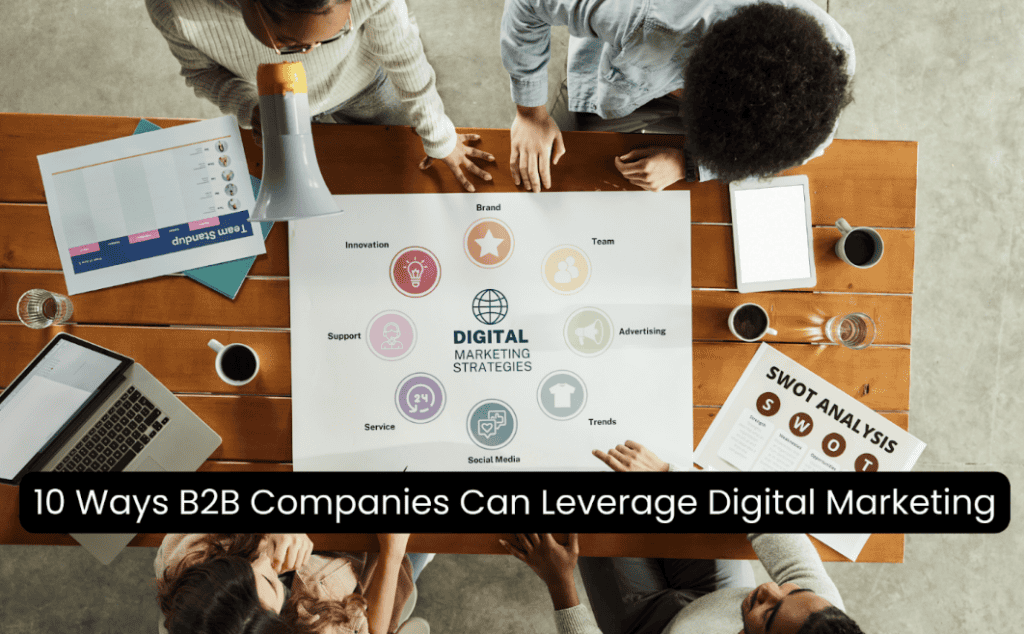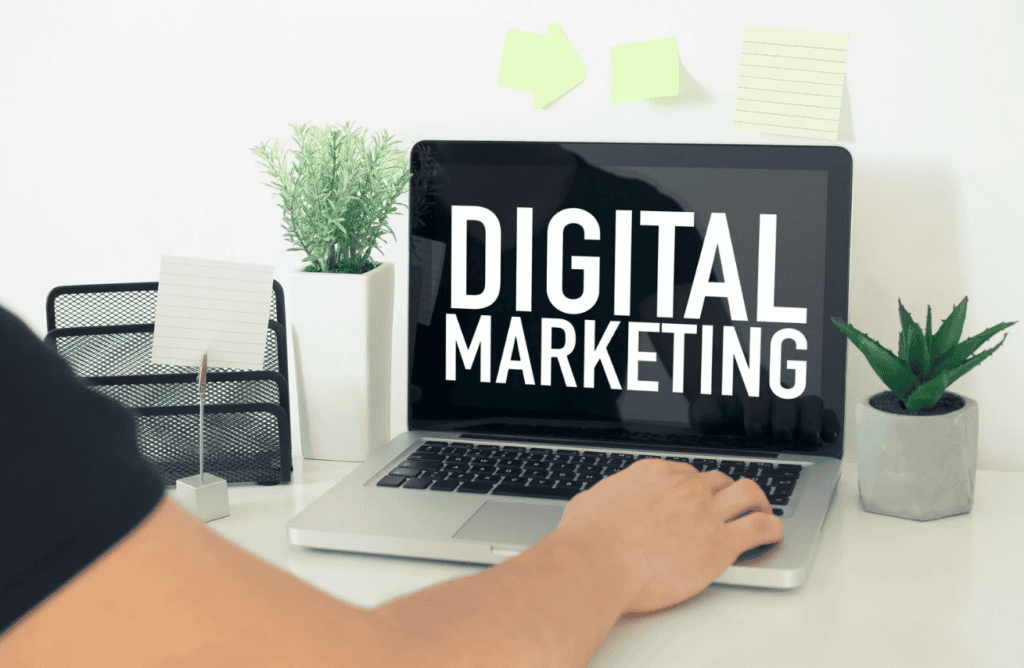In today’s hyper-competitive business landscape, digital marketing has become an indispensable tool for B2B companies seeking to stay ahead of the curve.
Table of Contents
Gone are the days when traditional marketing tactics alone were sufficient to reach and engage decision-makers. Now, B2B organizations must utilize a multifaceted digital strategy to effectively connect with their target audiences and drive meaningful results.
This article delves beyond basic digital marketing principles, providing actionable insights and real-world examples tailored specifically for experienced B2B marketers.

From enhanced targeting through Account-Based Marketing (ABM) to harnessing the power of artificial intelligence (AI), we’ll explore ten cutting-edge approaches that can elevate your digital marketing efforts and give your business a competitive edge.

1. Enhanced Targeting through Account-Based Marketing (ABM)
As B2B buyers become more discerning, Account-Based Marketing (ABM) has emerged as a game-changing approach. ABM focuses on identifying and engaging with your most valuable target accounts, rather than a broad, one-size-fits-all strategy.
To implement ABM effectively, start by aligning your sales and marketing teams to develop a comprehensive account profile. Leverage data integration and persona development to gain a deep understanding of your key decision-makers and their unique pain points.
Then, craft personalized, multi-channel campaigns that speak directly to the needs of your target accounts.
Case in point: A leading enterprise software company used ABM to focus on its top 100 accounts, resulting in significant increases in opportunities and pipeline value. This example highlights the power of ABM in today’s B2B marketing landscape.
By partnering with a B2B digital agency that possesses expertise in ABM strategies, companies can achieve exceptional results by focusing their efforts on the accounts that matter most.
2. Leveraging Artificial Intelligence for Customer Insights
The rise of artificial intelligence (AI) has significantly transformed the B2B marketing landscape, empowering companies to uncover valuable customer insights and make more informed decisions.
From predictive lead scoring to personalized content recommendations, AI-powered tools can provide invaluable data-driven intelligence to guide your digital marketing strategy. Integrate AI into your existing platforms to analyze customer behavior, identify high-value prospects, and optimize content and campaigns for maximum impact.
Consider the example of a global manufacturing firm that leveraged AI to analyze customer feedback and proactively address pain points, leading to improvements in lead generation and customer retention.
3. Strategic Content Marketing
Content marketing remains a cornerstone of successful B2B digital strategies, with decision-makers preferring vendors who provide value through content before making a purchase. However, to truly captivate your audience, you must go beyond generic, one-size-fits-all content.
Develop a content strategy that speaks directly to the unique challenges and interests of your target personas. Diversify your content mix to include white papers, case studies, webinars, and other formats that cater to the information-hungry B2B buyer.
Consistently delivering value-driven content will position your brand as a trusted industry authority and facilitate deeper engagement with your audience.
A B2B content marketing agency can be a strong asset in this area, helping you develop a data-driven content strategy that resonates with your target audience and achieves your marketing goals. They can also help with content creation, distribution, and measurement to ensure your content marketing efforts are successful.
4. Optimizing for Mobile and Local Search
In the fast-paced world of B2B, decision-makers are increasingly on the move, with a significant portion of B2B searches conducted on smartphones. Ensuring your digital presence is optimized for mobile is no longer a nice-to-have, but a critical component of any effective B2B marketing strategy.
Beyond mobile optimization, local search engine visibility is also crucial, as B2B buyers often seek out nearby vendors and service providers. Implement technical SEO best practices, create location-specific content, and leverage local listings to improve your discoverability in relevant geographical areas.
By focusing on mobile and local search optimization, you can reach your target audience wherever they are, positioning your brand as a convenient and accessible solution. Consider partnering with a B2B digital marketing agency or B2B internet marketing agency to optimize for mobile and local search.
5. Thought Leadership through Expert Webinars and Podcasts
Establishing your brand as a thought leader in your industry can be a powerful way to attract and engage B2B customers. By consistently sharing valuable insights and expertise through webinars and podcasts, you can position your company as a trusted advisor and a go-to resource for decision-makers.
When done right, webinars and podcasts can be highly effective in building brand awareness and nurturing leads. To launch a successful series, focus on topics that resonate with your target audience, leverage influential guest speakers, and promote your content across relevant channels to maximize reach and impact.
6. Social Media Strategies Tailored to B2B
While social media is often perceived as a more consumer-centric marketing channel, it can be a highly effective tool for B2B companies as well. However, the strategies and platforms that work for B2C may not necessarily translate to the B2B landscape.
When it comes to B2B social media, LinkedIn stands out as the clear frontrunner, as a significant portion of B2B leads generated on social media come from this platform.
Craft a content strategy that positions your brand as a thought leader, showcase your expertise through employee-generated content, and leverage LinkedIn targeting capabilities to reach and engage your ideal customers.
Complement your LinkedIn presence with a strategic approach to other platforms, such as Twitter and Quora, where you can actively participate in industry discussions and provide value-added insights to your audience.
7. Email Marketing Automation
In the world of B2B marketing, email remains a powerful tool for nurturing leads and building customer relationships. However, to truly maximize its impact, you must go beyond generic mass emails and embrace the power of email marketing automation.
Leverage segmentation, personalization, and triggered workflows to deliver highly tailored and relevant messages to your B2B audience. Personalized emails have been shown to generate significantly higher transaction rates compared to non-personalized emails, underscoring the importance of this approach.
Integrate your email marketing efforts with other digital channels, such as social media and your website, to create a seamless, omnichannel customer experience. By automating and optimizing your email campaigns, you can drive higher engagement, conversion rates, and ultimately, better return on investment.
8. Data-Driven Marketing and Analytics
In the digital age, data has become the lifeblood of effective marketing, and B2B companies must embrace a data-driven approach to stay competitive. By leveraging analytics and Key Performance Indicators (KPIs), you can gain valuable insights to refine your strategies and make more informed decisions.
Collect and analyze data from various sources, including website analytics, customer relationship management (CRM) systems, and marketing automation platforms. Use these insights to identify high-value target accounts, optimize content and campaigns, and measure the success of your digital marketing efforts.
Data-driven marketing can have a significant impact on your bottom line, as studies have shown that a data-driven approach can increase marketing ROI.
9. Integrating Offline and Online Marketing Strategies
In the B2B landscape, digital marketing cannot exist in a vacuum. To achieve maximum impact, it must be seamlessly integrated with your offline marketing efforts, creating a cohesive and cross-channel customer experience.
By aligning your online and offline strategies, you can leverage the best of both worlds. For example, use events and trade shows to generate leads and raise brand awareness, then nurture those leads through targeted digital campaigns.
Conversely, use digital platforms to promote and amplify the impact of your offline marketing initiatives. Successful integration requires careful planning, measurement, and tracking to understand the overall impact of your marketing efforts.
With B2B marketers viewing events as a crucial part of their marketing strategy, this integration is more important than ever. Consider seeking a B2B marketing strategy agency to help align your online and offline tactics.
10. Cybersecurity and Trust in Digital Interactions
As B2B companies increasingly rely on digital platforms to engage with customers, the importance of cybersecurity and trust cannot be overstated. Concerns over data privacy and security can significantly impact customer trust and brand reputation, making this a critical factor in your digital marketing strategy.
Ensure that your digital infrastructure and customer data management practices adhere to the highest security standards. Proactively communicate your commitment to data protection and cybersecurity to your B2B audience, positioning your brand as a trusted and reliable partner.
By addressing cybersecurity concerns and building a reputation for trustworthiness, you can enhance customer engagement, foster long-term loyalty, and ultimately drive better business results.
Consider the example of a B2B technology firm that implemented robust security measures, leading to significant improvements in customer retention and new business referrals.

How to Leverage Digital Marketing – FAQs
1. What is the most cost-effective digital marketing strategy for B2B companies?
The most cost-effective digital marketing strategy for B2B companies often depends on the specific business goals and target audience. However, several strategies tend to offer a favorable return on investment (ROI):
Email marketing automation: Personalized, segmented email campaigns can generate six times the transaction rates of non-personalized emails, making it a highly cost-effective approach.
Content marketing: Creating valuable, informative content that positions your brand as a trusted industry authority can attract and engage your target audience at a relatively low cost.
Social media marketing: Leveraging platforms like LinkedIn to establish thought leadership and foster connections with decision-makers can be an effective and cost-efficient strategy.
The key is to focus on the digital channels and tactics that align best with your B2B customer’s preferences and behaviors, and to continuously measure and optimize your efforts for maximum ROI.
2. How do B2B companies measure the success of digital marketing efforts?
Measuring the success of digital marketing initiatives for B2B companies typically involves tracking a range of key performance indicators (KPIs) and metrics, including:
Lead generation: Number of qualified leads, lead-to-opportunity conversion rate, and cost per lead.
Engagement: Website traffic, time on site, content engagement (e.g., downloads, video views), and social media interactions.
Pipeline and sales: Opportunities generated, deal size, win rate, and overall revenue attributed to digital marketing.
Return on investment (ROI): The overall return on digital marketing investment, factoring in both revenue and cost savings.
By regularly monitoring and analyzing these metrics, B2B companies can gain valuable insights to optimize their digital marketing strategies, make data-driven decisions, and demonstrate the tangible impact of their efforts.
3. Can small B2B companies compete effectively in digital marketing against larger firms?
Absolutely. Small and medium-sized B2B companies can effectively compete in the digital marketing landscape against larger enterprises by leveraging their inherent agility and niche expertise. Some strategies small B2B companies can employ include:
- Focusing on specific, underserved market segments and building a strong, personalized brand presence.
- Leveraging social media and content marketing to establish thought leadership and foster meaningful connections with target customers.
- Implementing nimble, data-driven marketing tactics that can be quickly tested and optimized.
- Providing exceptional, personalized customer service to build trust and loyalty.
- Collaborating with industry influencers and complementary businesses to expand reach and credibility.
By capitalizing on their unique strengths and adapting digital marketing strategies to their specific needs, small B2B companies can effectively compete and even outmaneuver larger players in the digital arena.
You Can Leverage Digital Marketing
The digital landscape for B2B companies is constantly evolving, and staying ahead of the curve requires a multifaceted approach.
By leveraging the strategies outlined in this article, from enhanced targeting through ABM to harnessing the power of data and cybersecurity, you can elevate your digital marketing efforts and position your business for long-term success.
Remember, the key to effective B2B digital marketing lies in adapting and experimenting with these approaches to find the right mix that aligns with your unique business goals and target audience.
Embrace a culture of continuous learning and innovation, and you’ll be well on your way to unlocking the full potential of digital marketing for your B2B organization.



